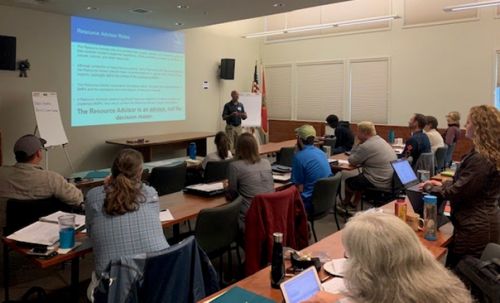Florida Emergency Support Function Resource Advisor Training Course
MARCH 9, 2020 — On February 26-27, the NOAA Disaster Preparedness Program (DPP) co-hosted a 2-day Emergency Support Function (ESF) Resource Advisor Training course for the state of Florida, at the Apalachicola National Estuarine Research Reserve.
Along with the DPP, the training course was developed and co-hosted with the Florida Keys National Marine Sanctuary, the Florida Fish and Wildlife Conservation Commission, and the Florida Department of Environmental Protection.
The purpose of the ESF Resource Advisor Training is to ensure the state of Florida has a number of coastal resource managers trained on the tools needed to successfully fill the Resource Advisor role either in an Incident Command Post (ICP) or in the field after an ESF-3 or ESF-10 activation. The training covered a wide range of topics including the National Response Framework and the ICS structure, use of an Incident Action Plan, the roles and responsibilities of a Resource Advisor, the tools Resource Advisors use in the field, overview of best management practices for unique cases in the field, appropriate and inappropriate coastal salvage techniques, and a discussion on environmental trade-offs. The course also included a small scale tabletop exercise that allowed trainees to walk through real world case studies from Hurricanes Irma and Michael, and get hands on experience with Resource Advisor tools including NOAA’s Environmental Response Management Application, NOAA’s Environmental Sensitivity Index maps, Survey 123, and Collector App in ArcGIS, to aid in decision making in the field and report recommendations to the ICP in an active response.
The ESF Resource Advisor course was taught by the Disaster Preparedness Program’s Southeast Regional Preparedness Coordinator, Charles Grisafi; the Florida Keys National Marine Sanctuary’s Regional Response Coordinator, Lisa Symons; the Florida Keys National Marine Sanctuary’s Enforcement Coordinator, Stephen Werndli; and the Florida Fish and Wildlife Conservation Commission’s Scientific Support Coordinator, Timyn Rice. This first course included 17 participants from NOAA, the Florida Department of Environmental Protection, and the Florida Fish and Wildlife Conservation Commission. Two additional courses for this fiscal year are planned for Tampa and Port St. Lucie, Florida, the week of March 23-27, 2020.
For more information on the ESF Resource Advisor Training, please contact Charles.Grisafi@noaa.gov.
Return to OR&R Weekly.
 An official website of the United States government.
An official website of the United States government.

